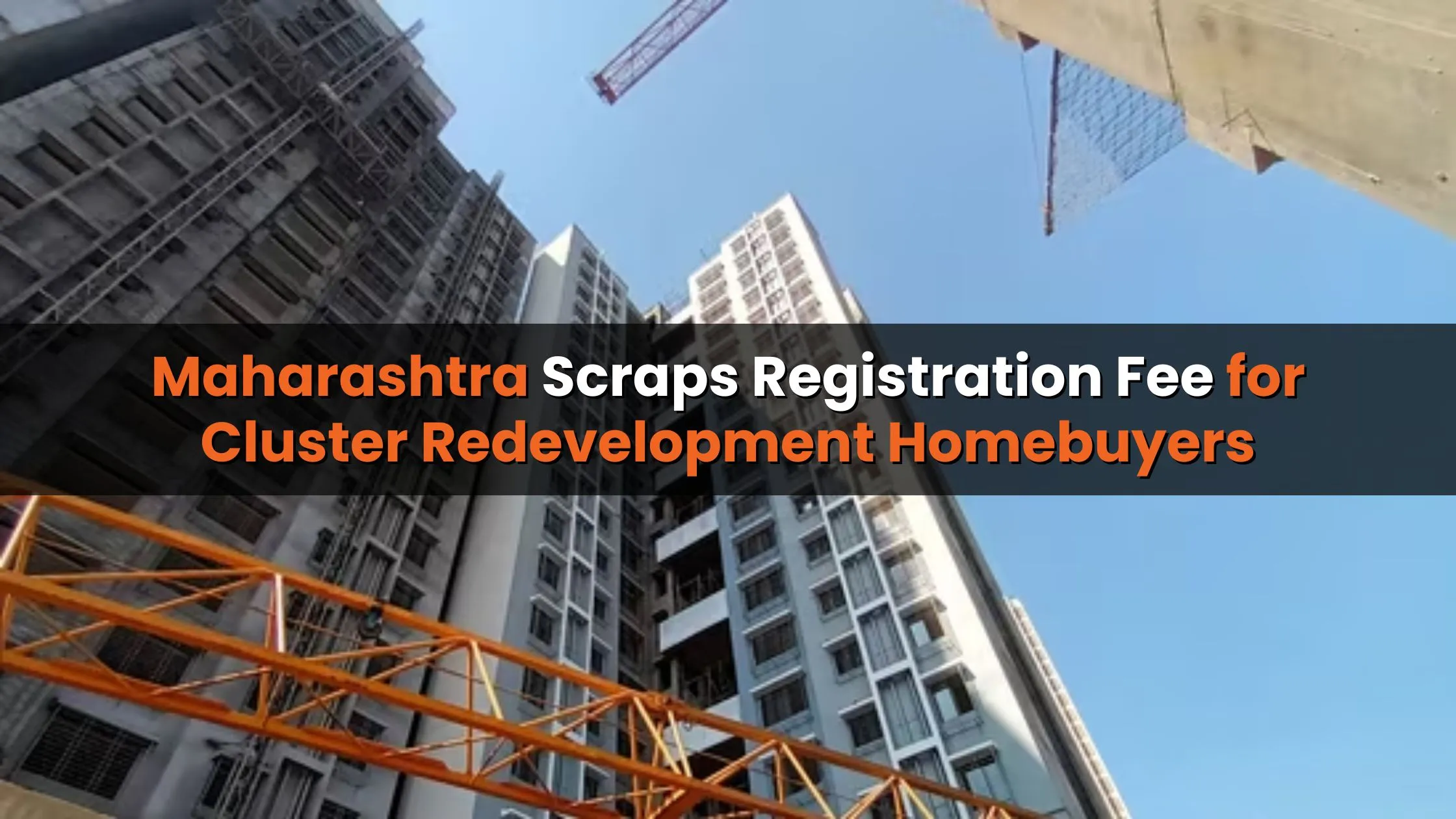Table of Content
▲
The Maharashtra government has announced a major relief measure for thousands of families living in unsafe and aging buildings in Mumbai. In a significant push to accelerate cluster redevelopment schemes, the state has decided to waive both stamp duty and registration fees for residents who receive new homes after redevelopment. The move directly benefits those allotted residences between 400 sq ft and 600 sq ft under approved cluster projects.
The order, issued by the Inspector General of Registration and Controller of Stamps on November 18, is expected to make homeownership more affordable for residents and encourage faster urban renewal across the city.
What Are Cluster Redevelopment Schemes?
Cluster redevelopment schemes involve the combined redevelopment of multiple old and dilapidated buildings into a single large-scale project.
This approach:
- Enhances public safety
- Modernizes civic and housing infrastructure
- Provides bigger and better-planned homes
- Unlocks unused development potential in dense urban areas
These projects have become crucial for transforming Mumbai’s aging neighborhoods into safe and liveable communities.
Also Read: Maharashtra Introduces Incentives to Boost Rental Housing in Mumbai Metropolitan Region
Key Features of the New Fee Waiver
Under the latest policy decision:
- Stamp duty and registration fees will no longer apply to residents receiving redeveloped units
- Applicable to 400–600 sq ft carpet area homes provided in exchange for old premises
- Benefits extend to additional areas granted under cluster redevelopment schemes
- The new space will be valued at a concessional rate, reducing the financial burden
Revenue Minister Chandrashekhar Bawankule said the new rule fulfills the long-standing dream of homeownership in Mumbai while boosting redevelopment efforts that have been stuck for years due to excessive costs.
Why the Change Was Needed
Previously, residents were required to pay stamp duty on the extra area received after redevelopment. This was calculated based on:
- Ready reckoner rates, or
- Construction value of the added space
For many families, especially middle-income residents, this resulted in significant expenses slowing progress of cluster redevelopment schemes and discouraging participation.
Reduced Costs, More Redevelopment Opportunities
With the new concessions:
- Homebuyers save lakhs of rupees in fees
- Developers gain financial support through lower duty obligations
- Long-pending projects are expected to finally move forward
Example savings:
- Small cluster of 4,000 sq meters → approx. ₹21 lakh saved per project
- Large project of 50,000 sq meters → approx. ₹4.36 crore waiver
This makes redevelopment financially viable for both residents and builders, strengthening the future of cluster redevelopment schemes across Mumbai.
Boost to Urban Transformation in Mumbai
The policy aims to:
- Replace unsafe structures with modern homes
- Improve roads, open spaces, and civic facilities
- Support families displaced from unsafe buildings
- Encourage private developers to take up large clusters
Once fully implemented, it could reshape large portions of South Mumbai and suburbs where old structures still dominate the skyline.
Also Read: Maharashtra Government Approves Free Regularisation of Small Land Plots
Political Reactions on Timing
Opposition leaders argue the move has been delayed intentionally until the upcoming BMC elections.
However, many residents and housing experts welcome it as a long-overdue reform that will finally provide relief to families awaiting redevelopment.
Conclusion
By waiving registration and stamp duty charges, the Maharashtra government has taken a decisive step to push cluster redevelopment schemes forward in Mumbai. This initiative not only reduces costs for beneficiaries but also removes a key hurdle in implementing major urban renewal projects. As redevelopment accelerates, thousands of households will gain safer homes, better amenities, and a stronger sense of ownership shaping a more resilient future for Mumbai’s housing landscape.



_1772441702.webp)


Ans 1. The Maharashtra government has waived stamp duty and registration fees for residents receiving redeveloped homes under approved cluster redevelopment schemes, particularly for units sized 400–600 sq ft.
Ans 2. Residents of old or unsafe buildings in Mumbai who are allotted new homes under cluster redevelopment projects will benefit, as well as developers by making projects financially more viable.
Ans 3. Cluster redevelopment schemes combine multiple old and dilapidated buildings into a single large-scale project, enhancing safety, modernizing infrastructure, and providing larger, better-planned homes.
Ans 4. Savings vary by project size. For example, a small cluster (4,000 sq meters) could save around ₹21 lakh, while a large project (50,000 sq meters) could save approximately ₹4.36 crore in fees.
Ans 5. Previously, residents had to pay stamp duty on extra area received after redevelopment, making projects expensive for middle-income families. The waiver reduces financial burden and accelerates stalled redevelopment projects.
Ans 6. No, it specifically applies to homes provided under approved cluster redevelopment schemes, generally sized between 400–600 sq ft, including additional area granted during redevelopment.
Ans 7. The waiver is expected to accelerate urban renewal, replace unsafe buildings with modern homes, improve infrastructure, and encourage private developers to undertake large cluster redevelopment projects.
Ans 8. The order was issued by the Inspector General of Registration and Controller of Stamps on November 18, 2025, making the fee waiver effective immediately for eligible beneficiaries.